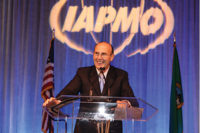Codes and standards provide the necessary solid foundation for consistent building practices. Without them, products manufactured by different com-panies may not fit together, and structures would likely struggle to survive the harsh environment.
IAPMO continues to be the go-to source for codes and standards development for jurisdictions globally. With a dedicated team, we advance the publication of documents that improve countless lives. The Uniform Codes have been revised with up-to-date provisions, and IAPMO standards have been updated for the safe use and application of products. Code development cycles were completed, state codes published, and well-respected IAPMO standards were published, all to protect the public’s health and welfare.
2021 UPC and UMC cycle completed
Completing the code change cycle for the 2021 UPC and UMC was a daunting task to say the least. With an accelerated schedule, the Code Development staff was resilient when faced with fast-approaching deadlines and multiple proposals coming from all aspects of the industry. The team answered all questions, and all comments were processed in a timely and efficient manner.
The UPC improved with the implementation of an appendix to address Legionella and scald risk potential. The Legionella Task Group produced the first code-enforceable language within a national code, providing for the implementation of key provisions from ASHRAE 188 and ASHRAE Guideline 12.
Legionella bacteria can cause serious types of pneumonia and fevers, so it is crucial that a code like the UPC provides jurisdictions with enforceable language.
ANSI accredits about 250 Standards Developing Organizations (SDOs) that develop American National Standards. Of those, ANSI has approved six organizations (ASTM, ASHRAE, UL, NSF, NFPA and IAPMO) to be Audited Designators — the highest level of standards development — enabling each of these six organizations to self-designate their standards included in the audited designator program. IAPMO has been one such SDO for the past decade, and we are very proud to have achieved this designation.
Subject matter experts volunteer in the creation of IAPMO’s Uniform Codes. These SMEs are critical to our ability to advance innovative technology via inclusion in our various codes and standards. Our volunteer system in the United States is unique because in most countries, a national standards body, typically a government agency or department, is responsible for the ongoing development and maintenance of national or international codes and standards. I appreciate the ANSI process because it emphasizes the public-private relationship wherein government departments work collaboratively with the private sector. This includes, in IAPMO’s case, all major industry sectors, thus providing up-to-date codes and standards provisions. The U.S. voluntary consensus development process stands as a model of efficiency and a testament to the many qualified and skilled SMEs who give their expertise and experience in creating world-class codes and standards.
IAPMO Standards Development is the best in the plumbing industry for publishing American National Standards (ANS), National Standards of Canada (NSC) and Industry Standards. Every person from this team brings something unique to the table. Some review the technical contents for accuracy, some provide a secondary review, and others inspect grammar and layout. Our ANSI, NSC and Industry Standards help improve the lives of many.
When a new product comes to the market, the industry must not only have confidence it will function as intended, but more importantly, that is safe for public use. There are many standards that started out as an Industry Standard and now are a normal part of our lives.
IAPMO Codes and Standards Development prides itself as being the go-to-source for new and novel products. Many innovators and manufactures have taken advantage of IAPMO’s services to ensure that their novel products find their way into the industry.
As technology rapidly improves, IAPMO Codes and Standards is ready to meet the industry’s needs.



